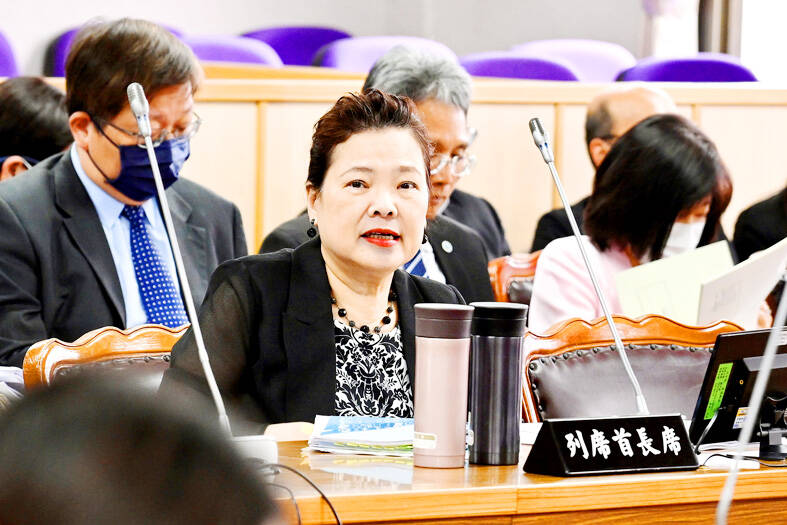Minister of Economic Affairs Wang Mei-hua (王美花) yesterday welcomed bilateral discussions “without preconditions” regarding an investigation launched by Beijing into Taiwan’s trade restrictions on select Chinese goods.
The Chinese Ministry of Commerce (MOC) on Wednesday announced that it had opened an investigation into tariffs and other “unilateral” restrictions on 2,455 Chinese products, including agricultural, textile and mineral products.
The MOC said in a statement that it had launched the investigation following the filing of formal complaints by several Chinese trade and industry bodies.

Photo: George Tsorng, Taipei Times
It added that the probe was scheduled to conclude on Oct. 12, but could be extended by three months to Jan. 12 next year if necessary.
Wang yesterday said that if there were “no preconditions, [and] China wants to consult with us, we are willing to do so.”
However, asked if her ministry would take the initiative and raise the issue with Beijing, Wang said the ball was in China’s court.
On Wednesday, the Bureau of Foreign Trade said that China had failed to notify the relevant individuals, government agencies and other parties under investigation as required by the MOC’s own rules.
The Chinese ministry’s regulations dictate that it hold bilateral consultations or start a settlement mechanism for a multilateral dispute if the measures under investigation are confirmed to constitute a trade barrier, the board said.
Meanwhile, the Council of Agriculture said that Taiwan and China are both members of the WTO and any dispute over agricultural trade could be discussed through bilateral channels first.
The launch of the MOC’s probe has sparked concern that China might eliminate preferential trade conditions afforded to certain Taiwanese goods under the Cross-Straits Economic Cooperation Framework Agreement.
However, a representative from a domestic petrochemical company said that they doubted Beijing would abandon the agreement with such ease.
China might be using the investigation and recent military drills to gauge the reaction of the Taiwanese government to its economic and military actions, the representative said.

Alain Robert, known as the "French Spider-Man," praised Alex Honnold as exceptionally well-prepared after the US climber completed a free solo ascent of Taipei 101 yesterday. Robert said Honnold's ascent of the 508m-tall skyscraper in just more than one-and-a-half hours without using safety ropes or equipment was a remarkable achievement. "This is my life," he said in an interview conducted in French, adding that he liked the feeling of being "on the edge of danger." The 63-year-old Frenchman climbed Taipei 101 using ropes in December 2004, taking about four hours to reach the top. On a one-to-10 scale of difficulty, Robert said Taipei 101

Nipah virus infection is to be officially listed as a category 5 notifiable infectious disease in Taiwan in March, while clinical treatment guidelines are being formulated, the Centers for Disease Control (CDC) said yesterday. With Nipah infections being reported in other countries and considering its relatively high fatality rate, the centers on Jan. 16 announced that it would be listed as a notifiable infectious disease to bolster the nation’s systematic early warning system and increase public awareness, the CDC said. Bangladesh reported four fatal cases last year in separate districts, with three linked to raw date palm sap consumption, CDC Epidemic Intelligence

US climber Alex Honnold left Taiwan this morning a day after completing a free-solo ascent of Taipei 101, a feat that drew cheers from onlookers and gained widespread international attention. Honnold yesterday scaled the 101-story skyscraper without a rope or safety harness. The climb — the highest urban free-solo ascent ever attempted — took just more than 90 minutes and was streamed live on Netflix. It was covered by major international news outlets including CNN, the New York Times, the Guardian and the Wall Street Journal. As Honnold prepared to leave Taiwan today, he attracted a crowd when he and his wife, Sanni,

Two Taiwanese prosecutors were questioned by Chinese security personnel at their hotel during a trip to China’s Henan Province this month, the Mainland Affairs Council (MAC) said yesterday. The officers had personal information on the prosecutors, including “when they were assigned to their posts, their work locations and job titles,” MAC Deputy Minister and spokesman Liang Wen-chieh (梁文傑) said. On top of asking about their agencies and positions, the officers also questioned the prosecutors about the Cross-Strait Joint Crime-Fighting and Judicial Mutual Assistance Agreement, a pact that serves as the framework for Taiwan-China cooperation on combating crime and providing judicial assistance, Liang